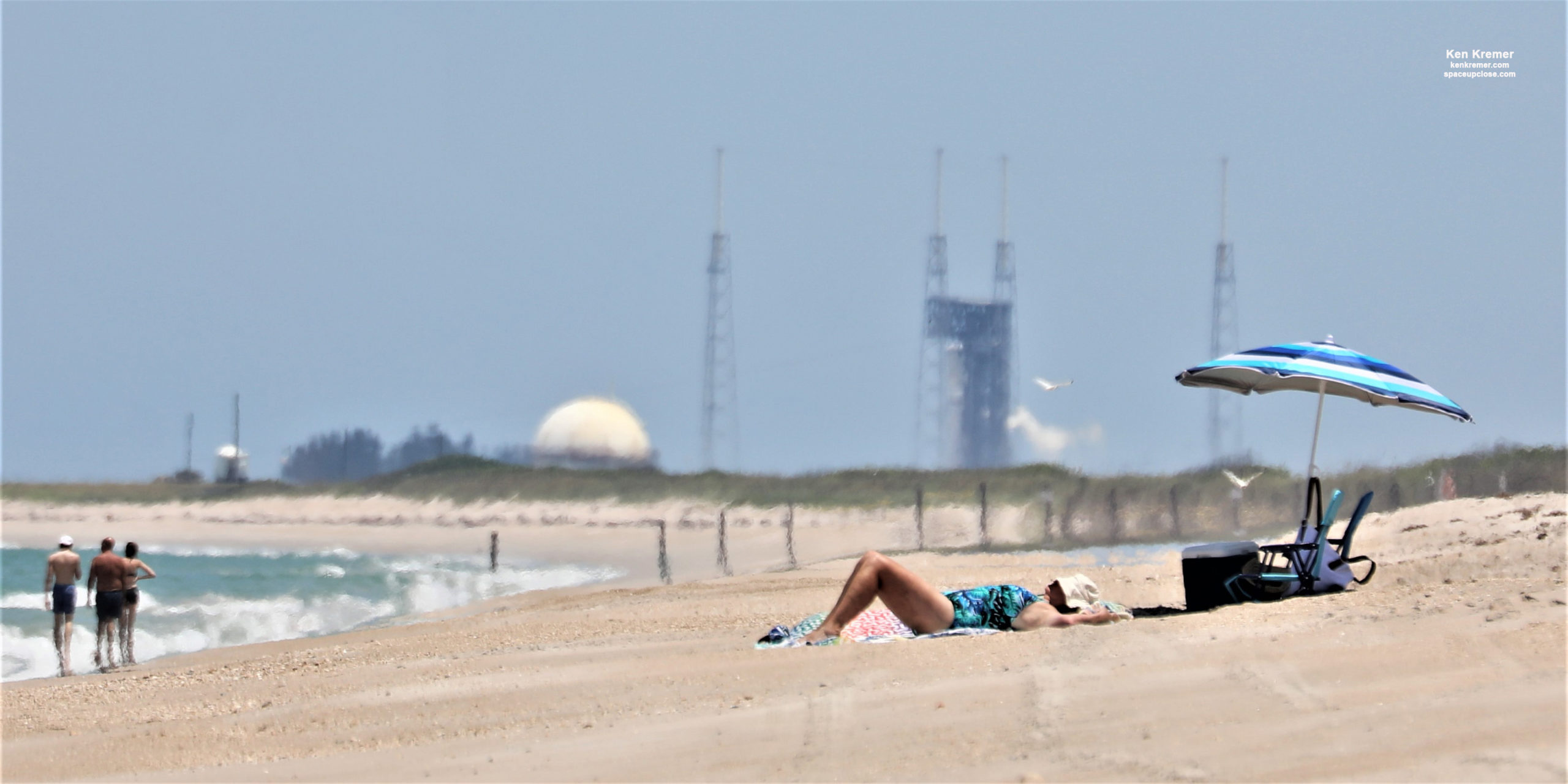
For SpaceUpClose.com & RocketSTEM
PLAYALINDA BEACH, FL – The joint United Launch Alliance and NASA launch team completed the critical launch countdown Wet Dress Rehearsal or WDR demonstration test Monday afternoon – thereby achieving a major milestone towards liftoff of NASA’s Mars Perseverance Rover a month from now on the firms venerable Atlas V rocket.
It was a beautiful sunny day for the WDR test run of the Atlas V booster at pad 41 on the Florida Space Coast this afternoon, June 22.
The WDR is a practice countdown demonstration to fuel and test all systems of the ULA Atlas V rocket to ensure the rockets readiness for launch during the upcoming launch window when spacecraft can launch to the Red Planet from Earth.
Such opportunities are dictated purely by celestial mechanics and only occur every 26 months when the Earth and Mars are properly aligned.
I was on hand to witness the WDR test at Playalinda Beach at Canaveral National Seashore as the final cryogenic propellant loading was completed and the test conducted up to the point of ignition at 1:55 PM ET (1755 GMT) today, Monday, June 22, but NOT including ignition of the first stage engines.
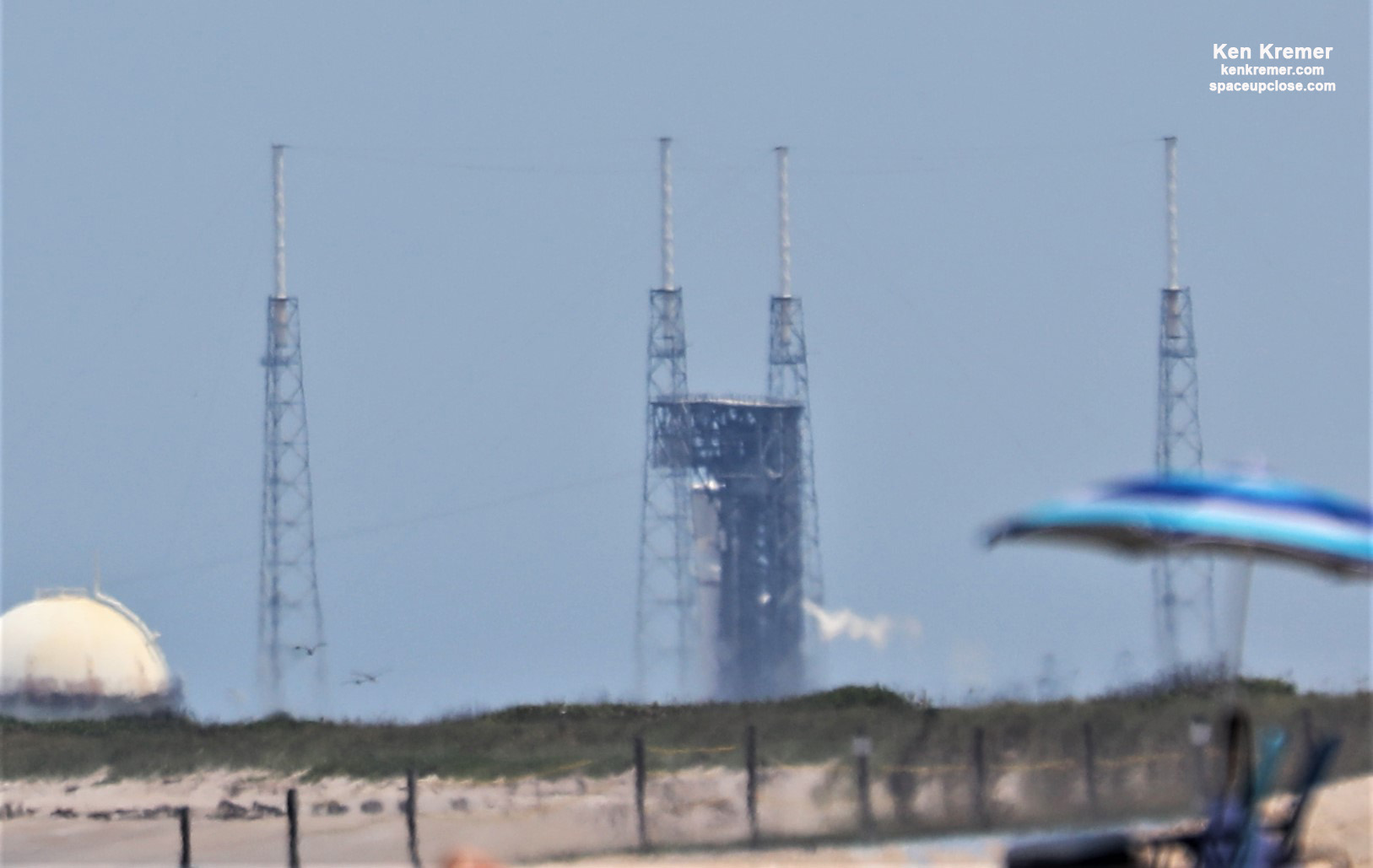
“Today’s #AtlasV test was successfully completed at 1:55pmEDT (1755 UTC). Systems will be safed, cryogenic fuels drained and the rocket allowed to warm up before rollback to the Vertical Integration Facility for Mars 2020 attachment,” ULA tweeted after the WDR test.
Today's #AtlasV test was successfully completed at 1:55pmEDT (1755 UTC). Systems will be safed, cryogenic fuels drained and the rocket allowed to warm up before rollback to the Vertical Integration Facility for Mars 2020 attachment. https://t.co/iq4oKMrMuA pic.twitter.com/38wFSaUXFV
— ULA (@ulalaunch) June 22, 2020
A small crowd of beachcomers and bathers were present and a few birds were flying about.
But virtually all were completely oblivious to the rather critical ongoing rocket operation necessary to ensure that NASA’s next Mars rover Perseverance and its Atlas V carrier rocket are fully ready to meet the challenge of launching at the opening of the 3-week-long launch opportunity period which now begins on July 20.
Its just absolutely amazingly special to see a huge rocket sitting virtually on the shore of a public beach.
There is no other place like the Florida Space Coast in the world.
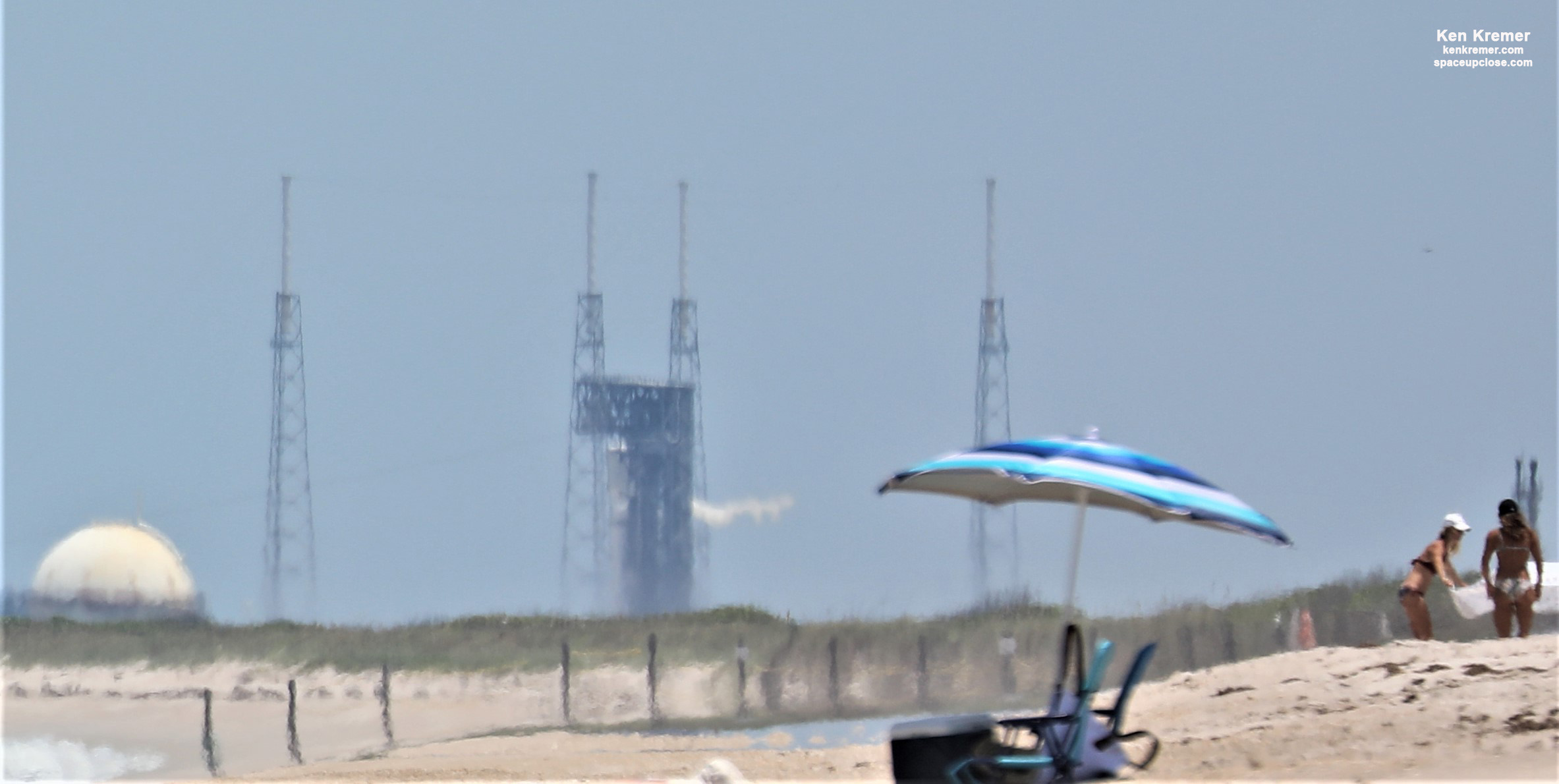
The WDR – which is run by the team based at the Atlas Spaceflight Operations Center (ASOC) on Cape Canaveral Space Force Station – does not include a static fire test as SpaceX routinely does for their Falcon 9 family rockets.
“Today’s #AtlasV Mars 2020 Wet Dress Rehearsal is being conducted at Cape Canaveral’s Space Launch Complex-41 to test hardware and systems in a real-life scenario. The practice includes virtually all countdown operations and will conclude before engine start,” ULA tweeted.
Today's #AtlasV Mars 2020 Wet Dress Rehearsal is being conducted at Cape Canaveral's Space Launch Complex-41 to test hardware and systems in a real-life scenario. The practice includes virtually all countdown operations and will conclude before engine start. #CountdownToMars pic.twitter.com/muCFQj83jK
— ULA (@ulalaunch) June 22, 2020
I observed vigorous venting of the second stage liquid oxygen or LOX during the fuel loading leading up to the WDR conclusion and after it was completed.
Boosters, birds and beachcombers with 2nd stage LOX venting at Playalinda Beach this afternoon as #ULA conducts Wet Dress Rehearsel #WDR on #AtlasV rocket for @NASAPersevere Mars Rover. Launch target July 20 #Pad41 pic.twitter.com/ZVDbjhaNCN
— Ken Kremer🇺🇦🇩🇪🇺🇸🚀🧪 (@ken_kremer) June 22, 2020
Enjoy our eyewitness Space UpClose photos of the WDR test.
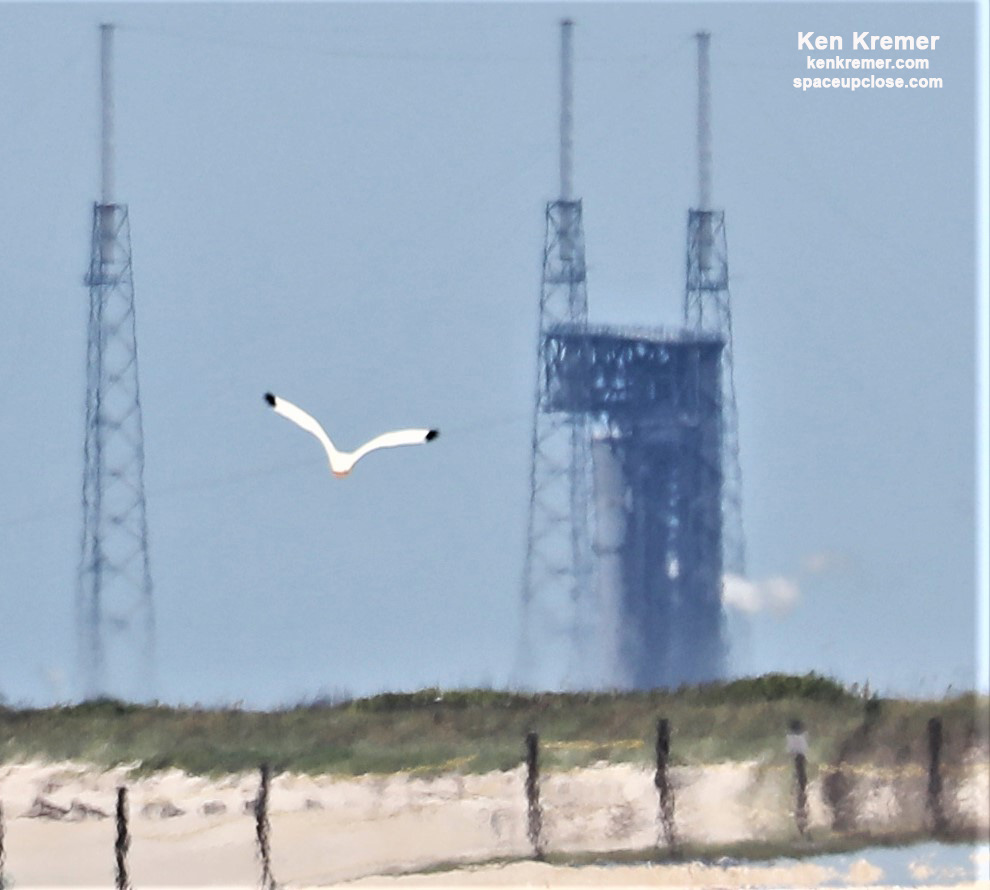
NASA requested ULA perform the WDR to ensure the Atlas V rocket is ready for the immutable 3 week launch window.
Any delay to the next launch opportunity 26 months later would cost NASA $500 million – and would inevitably be taken from future planetary science missions such as the Mars Sample Return planned for later this decade and would result in a launch delay or potentially cancellation.
#AtlasV, without the Mars 2020 @NASAPersevere payload, rolls to the pad for its Wet Dress Rehearsal. The countdown demonstration will fuel and test the rocket to ensure systems are ready for the upcoming window when Earth can launch spacecraft to Mars. #CountdownToMars pic.twitter.com/Jp1p4tnfbo
— ULA (@ulalaunch) June 20, 2020
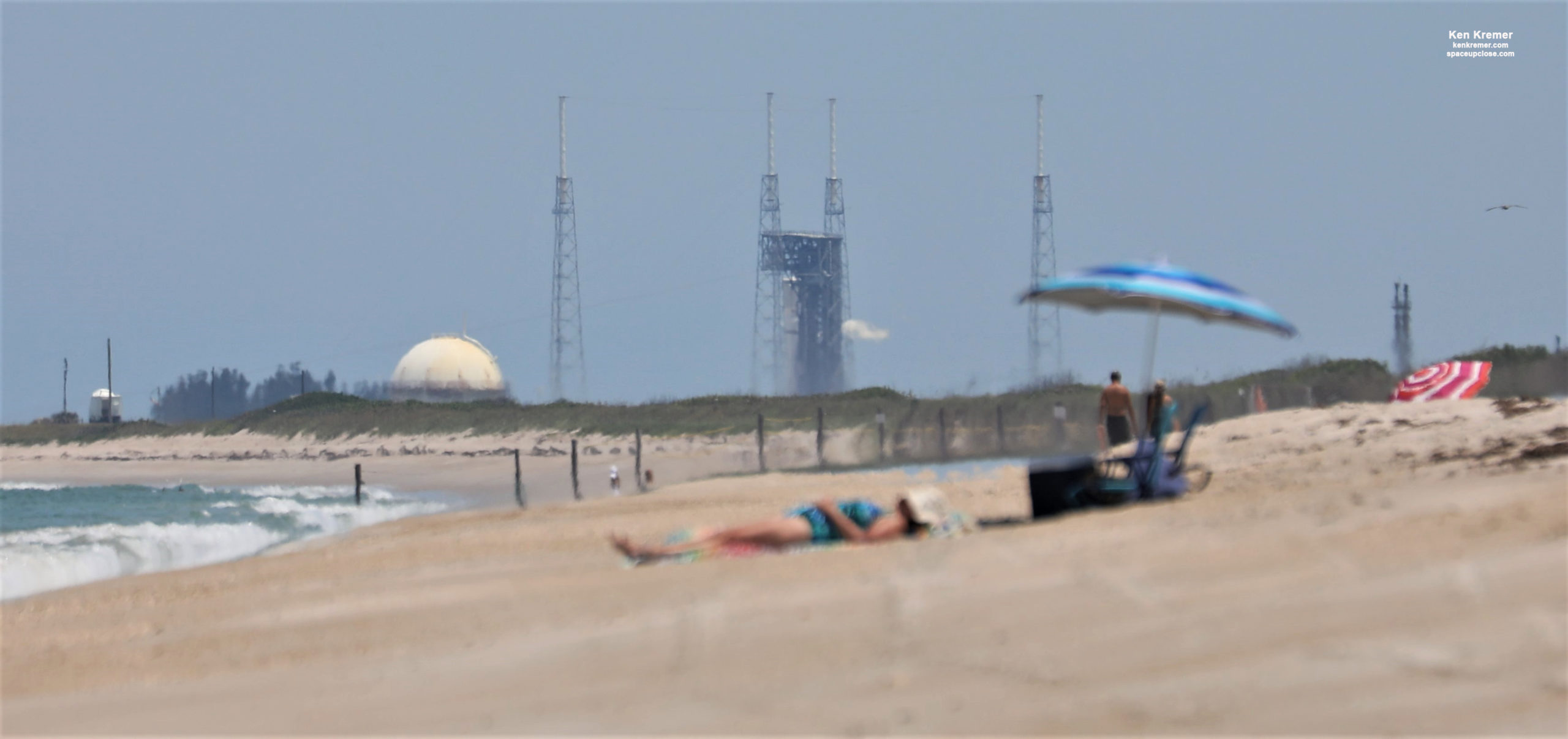
Just 5 minutes before finishing the test the launch conductor gave the GO to proceed with the terminal countdown demonstration.
“All systems are “go” as we enter the final phase of the countdown for today’s #AtlasV rehearsal of the @NASAPersevere launch day. ULA Launch Conductor Scott Barney polled the team and ULA Launch Director Bill Cullen gave permission to enter terminal count,” ULA said.
All systems are "go" as we enter the final phase of the countdown for today's #AtlasV rehearsal of the @NASAPersevere launch day. ULA Launch Conductor Scott Barney polled the team and ULA Launch Director Bill Cullen gave permission to enter terminal count. https://t.co/iq4oKMrMuA pic.twitter.com/DsKu4fdTyr
— ULA (@ulalaunch) June 22, 2020
In preparation for today’s test 66,000 gallons of cryogenic liquid oxygen LOX and liquid hydrogen LH2 propellants were loaded into the Atlas V rocket 1st and 2nd stages.
Today's #AtlasV test is called a Wet Dress Rehearsal for a reason. Cryogenic fueling operations have begun at Space Launch Complex-41 to load the rocket with 66,000 gallons of liquid oxygen and liquid hydrogen as we demonstrate day-of-launch operations. https://t.co/iq4oKMrMuA pic.twitter.com/igU4tbaBN1
— ULA (@ulalaunch) June 22, 2020
To prepare for the test the stacked Atlas V rocket – minus the payload fairing and Perseverance – was rolled out to the pad on Saturday, June 21 and 25,000 gallon RP-1 propellant was then loaded into the first stage by the launch NASA/ULA team.
#DYK: After rollout to the pad on Saturday, the #AtlasV rocket first stage was loaded with 25,000 gallons of RP-1, a highly refined kerosene. The room-temperature fuel will remain stored aboard the rocket from now through launch, a standard practice for missions with WDRs. pic.twitter.com/iSfEvUwNWp
— ULA (@ulalaunch) June 22, 2020
RP-1 is a highly refined kerosene that can be stored at room temperature and will remain now on board the rocket through the launch.
In contrast LOX and LH2 were fully detanked and drained today following safing of the Atlas V rocket.
Perseverance is a robotic scientist weighing about 2,260 pounds (1,025 kilograms).
Scheduled to launch in July 2020, the Perseverance Mars 2020 mission will search for signs of past microbial life, characterize Mars’ climate and geology, collect samples for future return to Earth, and pave the way for human exploration of the Red Planet.
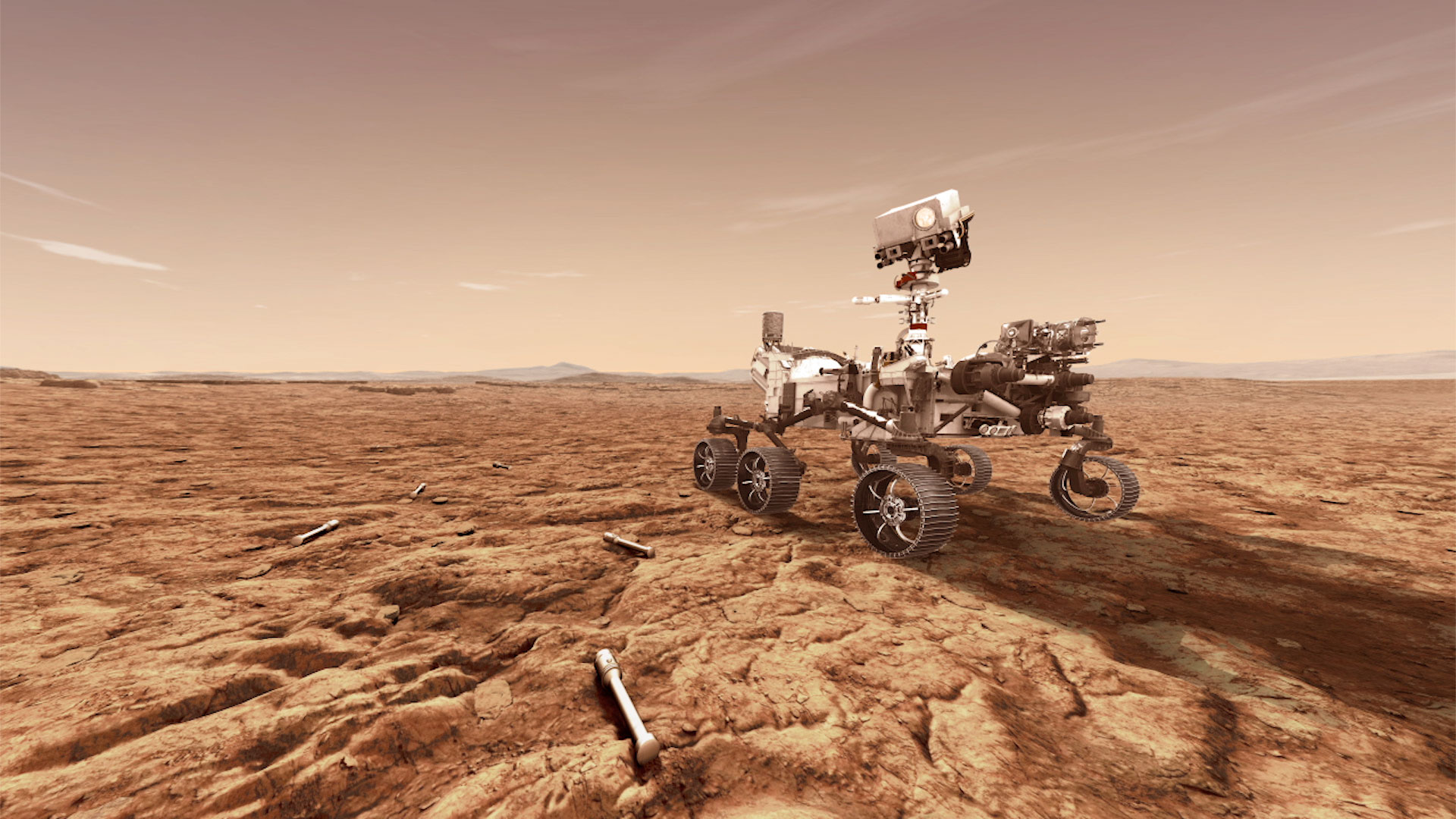
The car-sized Perseverance Mars 2020 rover is targeted for liftoff on 20 July 2020 aboard a United Launch Alliance (ULA) Atlas V 541 rocket from Space Launch Complex 41 on Cape Canaveral Air Force Station.
She is scheduled to touch down in an area of Mars known as Jezero Crater on Feb. 18, 2021.
The 1 ton rover is nearly a copy of the NASA’s Curiosity Mars Science Lab rover still operating on Mars – but with a completely new suite of science instruments and cameras as well as the 1st Mars Helicopter.
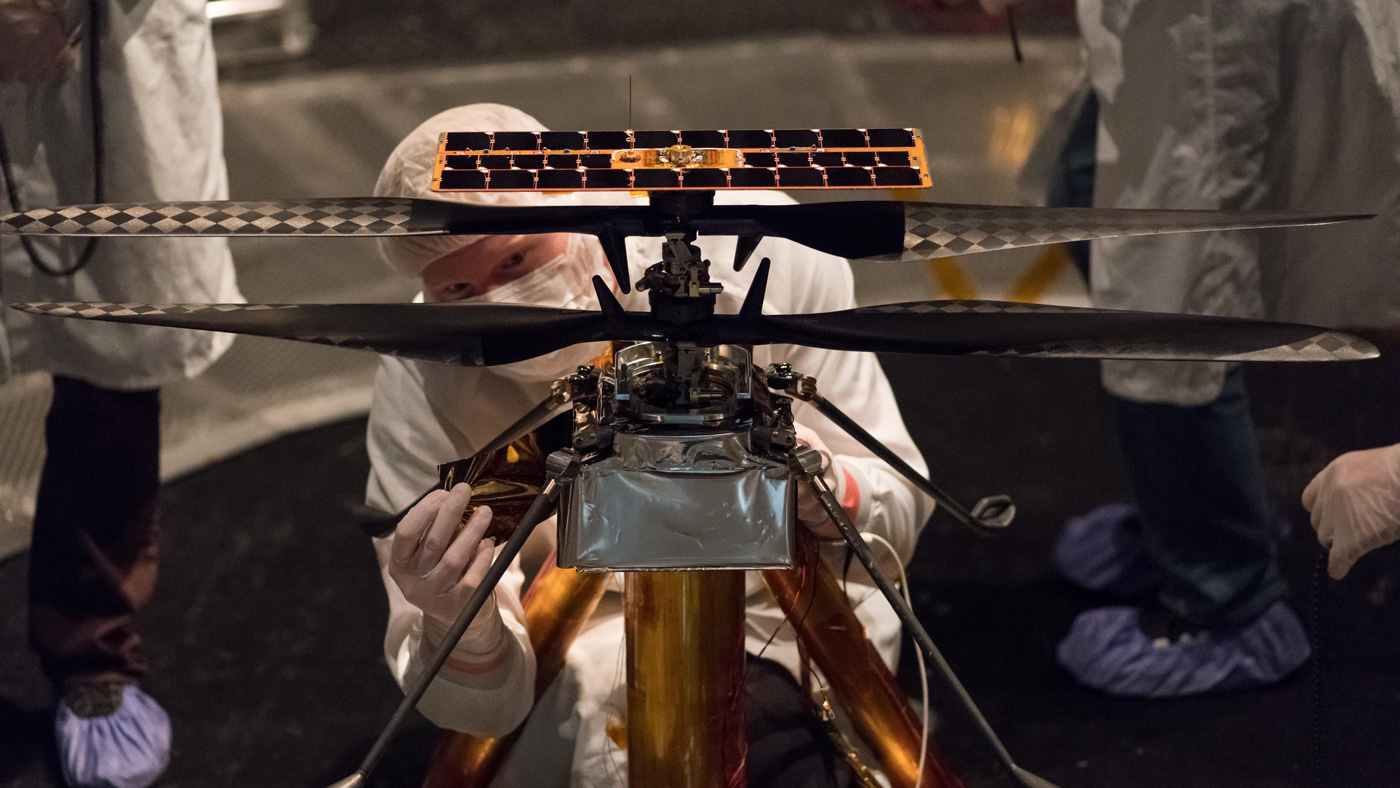
Meanwhile Curiosity continues to explore the Red Planet at Mount Sharp since the dramatic touchdown in 2012.
ESA’s plans to launch their ExoMars 2020 rover this summer have been delayed to 2022 in part due to the COVID-19 crisis and resolves parachute landing system issues as well.
Watch my live post ULA Atlas V WDR interview about Mars 2020 rover and more at the American Space Museum ‘Stay Curious’ daily weekday show on June 22, 2020:
https://www.facebook.com/SpaceWalkOfFame/videos/304165737643422/UzpfSTY1OTc4NDE4NjoxMDE1ODc1MTcyNTAxNDE4Nw/
Watch Ken’s continuing reports about Mars 2020, Commercial Crew and Artemis for live reporting of upcoming and recent NASA, ULA and SpaceX launches including Demo-2, Starlink, X-37B, Solar Orbiter and more at the Kennedy Space Center and Cape Canaveral Space Force Station.
Stay tuned here for Ken’s continuing Earth and Planetary science and human spaceflight news: www.kenkremer.com –www.spaceupclose.com – twitter @ken_kremer – email: ken at kenkremer.com
Dr. Kremer is a research scientist and journalist based in the KSC area, active in outreach and interviewed regularly on TV and radio about space topics.
………….
Ken’s photos are for sale and he is available for lectures and outreach events
Ken has created hundreds of widely published Mars rover mosaics and lectures also about NASA’s Mars rovers
Ken’s upcoming outreach events:
Jun 24: 7 PM, Quality Inn Kennedy Space Center, Titusville, FL. “SpaceX Demo-2 and Starlink launches and NASA/ ULA Atlas V Mars 2020 rover and more launches” Free. In hotel lobby. Photos for sale



